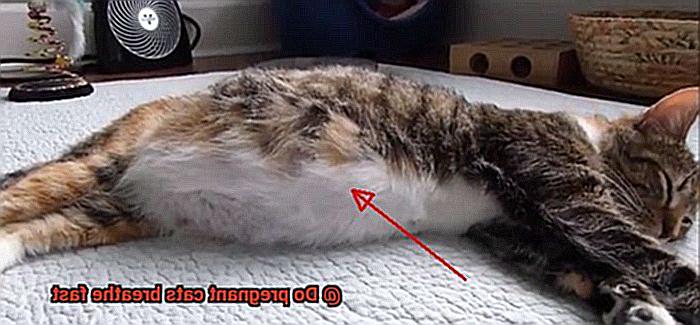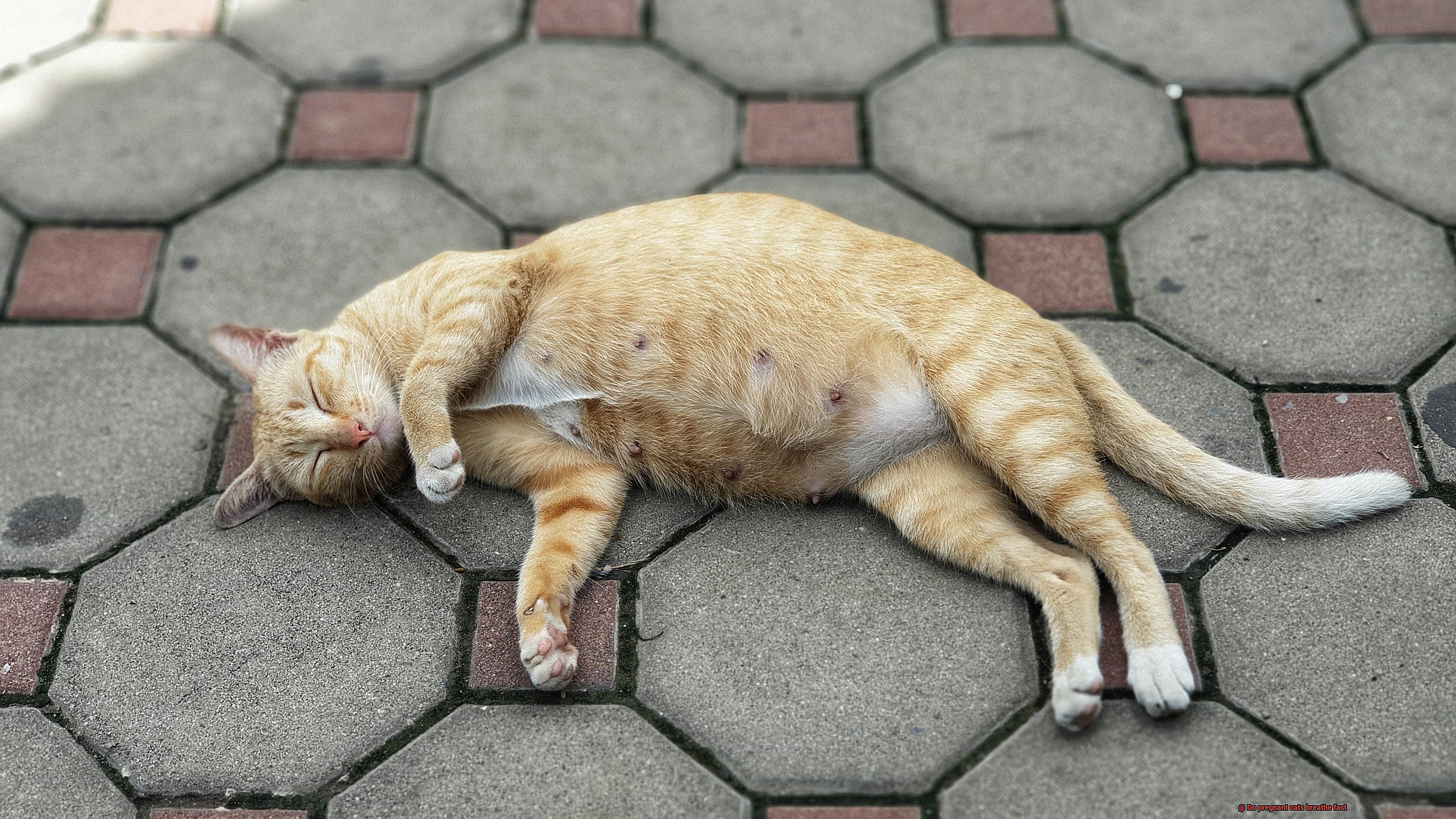Do you ever notice your pregnant cat breathing faster than usual? You may be wondering if this is normal or something to worry about.
In this blog post, we’ll explore why pregnant cats breathe faster and what you can do to help your feline friend stay healthy during her pregnancy.
We’ll cover all the details on Do pregnant cats breathe fast, from understanding changes in respiration rate to knowing when it’s time for a vet visit.
So, grab your favorite catnip toy and let’s get started.
What Is Rapid Breathing In A Pregnant Cat?
Pregnant cats often experience rapid breathing, which is a normal part of the process.
Hormones surge during pregnancy, causing cats to pant more than usual. The extra weight of the kittens can also make it difficult for the cat to breathe properly.
Stress or anxiety can be a factor too, as cats are very sensitive creatures.
If your cat is exhibiting rapid breathing, it may be indicative of an underlying medical condition, so it’s important to visit your vet right away to ensure your pregnant cat is healthy.
Why Is My Pregnant Cat Panting?
It’s a normal symptom of pregnancy in cats. It can be caused by the increased metabolic rate due to the growing fetus, as well as the hormonal changes that occur during pregnancy.

Furthermore, panting can also be triggered by stress or fear, so it’s important to keep your pregnant cat in a low-stress environment.
Additionally, panting can be a sign of an underlying medical condition such as an infection or heart disease, so if you notice any changes in your cat’s breathing it is important to take her to the vet.
If you have any questions about why your pregnant cat is panting, please contact your veterinarian for more information and advice.
Other Reasons For Pregnant Cat Breathing Heavy
Heavy breathing in pregnant cats is a common symptom, but it can also be a sign of other health issues. Respiratory infections, heart disease, asthma, allergies and even stress can all cause your pregnant cat to pant and breathe heavily.
Pregnant cats are more susceptible to respiratory infections due to their weakened immune systems. When the body is fighting an infection, it needs more oxygen and so the cat’s breaths will be quicker and heavier than normal.
Heart disease can also cause heavy breathing in pregnant cats. If the heart isn’t able to pump enough blood around the body, it makes it difficult for the cat to get enough oxygen into the lungs – resulting in heavy breathing.
Asthma and allergies can also make it hard for a pregnant cat to breathe properly as swelling or mucus buildup narrows the airways – making it impossible for them to take in enough air. Panting and heavy breathing are common symptoms of this condition.
Stress can also cause pregnant cats to pant and breathe heavily as their bodies release hormones that bring them into an elevated state of alertness, making them breathe faster than usual.
If you notice that your pregnant cat is breathing heavily, seek veterinary assistance as soon as possible. There could be an underlying medical condition that needs urgent attention.
What Are The Symptoms Of Heavy Breathing In Pregnant Cats?
Heavy breathing in pregnant cats can be a sign of stress, pain, or an underlying medical condition. It’s important to monitor your cat’s health and seek veterinary assistance as soon as possible if you notice any of the following symptoms.
Panting
Panting is a common sign of heavy breathing in pregnant cats. If your cat is panting, it may be a sign of anxiety or discomfort and should be examined by a veterinarian right away.
Rapid breathing
Rapid breathing is another symptom to look out for. If the cat’s breath rate is much faster than normal (over 40 breaths per minute), it could indicate an infection or other medical issue.
Coughing, wheezing, and nasal discharge
Coughing, wheezing, and nasal discharge are all signs of heavy breathing in pregnant cats that should not be ignored. If your cat exhibits any of these symptoms, it’s critical to bring them to the vet for evaluation and treatment.
Heavy Breathing
Heavy breathing in pregnant cats can be a serious problem that requires immediate attention. Pay attention to any warning signs your cat may be displaying, and don’t hesitate to consult your veterinarian if you have any concerns about their wellbeing.
How To Diagnose Heavy Breathing In Pregnant Cats?
Observe the Cat’s Behavior
When trying to diagnose heavy breathing in pregnant cats, it is important to observe the cat’s behavior.
Look for signs of distress, such as panting, drooling, or excessive meowing. Also, watch for any changes in the cat’s appetite or energy level.
If the cat seems to be having difficulty breathing, this could be a sign of a serious medical condition.
Check the Cat’s Temperature
One of the most important steps in diagnosing heavy breathing in pregnant cats is to take the cat’s temperature.
If the cat’s temperature is higher than normal, this could indicate a fever or infection.

It is also important to check for any other signs of illness, such as coughing, sneezing, or discharge from the eyes or nose.
Listen for Abnormal Sounds
Another way to diagnose heavy breathing in pregnant cats is to listen for any abnormal sounds coming from the cat’s chest or abdomen.
If you hear wheezing, crackling, or gurgling noises, this could indicate a respiratory infection or other medical condition.
It is important to take your cat to the veterinarian if you notice any of these symptoms.
Take Your Cat to the Vet
The best way to diagnose heavy breathing in pregnant cats is to take them to the veterinarian.
The vet will be able to perform a physical exam and run tests to determine the cause of the heavy breathing.
They may also recommend treatments such as antibiotics or oxygen therapy. It is important to follow your vet’s instructions and keep an eye on your cat’s symptoms until they improve.
How To Treat Heavy Breathing In Pregnant Cats?
Recognizing Heavy Breathing in Pregnant Cats
Heavy breathing in pregnant cats is a common occurrence, and it is important for cat owners to recognize the signs.
When a pregnant cat is breathing heavily, her breaths will be deeper and more labored than normal.
Additionally, her chest may move more visibly when she inhales, and she may also have an increased respiratory rate.
Understanding the Causes of Heavy Breathing in Pregnant Cats
Heavy breathing in pregnant cats can be caused by a variety of factors. One of the most common causes is the increased size of the uterus, which can put pressure on the lungs and make it difficult for the cat to breathe.
Additionally, hormonal changes can lead to an increase in respiratory rate as well as an increase in body temperature.
Consulting a Veterinarian
If you suspect that your pregnant cat is having difficulty breathing, it is important to consult a veterinarian right away.
Your vet will be able to assess your cat’s condition and determine the underlying cause of the heavy breathing.
Depending on the cause, they may recommend medications or other treatments to help ease your cat’s breathing.
Making Environmental Changes
Making environmental changes can also help reduce heavy breathing in pregnant cats.
Keeping your cat’s living area cool and well-ventilated can help reduce her body temperature and make it easier for her to breathe.
Additionally, providing your cat with plenty of comfortable bedding can help to reduce pressure on her lungs and make it easier for her to breathe.
Providing Nutritional Support
Nutrition is also important for pregnant cats who are having difficulty breathing.
Providing your cat with a balanced diet that is high in protein and low in carbohydrates can help support her overall health and make it easier for her to breathe.
Additionally, providing your cat with plenty of fresh water can help to keep her hydrated and reduce her respiratory rate.
Tips For Keeping Your Pregnant Cat Healthy
Caring for a pregnant cat can be a challenging task. To ensure that your pregnant cat and her kittens stay healthy, it is important to provide her with the right nutrition, exercise, and care. Here are eight tips for keeping your pregnant cat healthy.
Balanced Diet
Make sure that your pregnant cat is getting all the necessary nutrients and minerals to support her health. This includes proteins, fats, carbohydrates, vitamins, and minerals.
Exercise
Exercise helps keep your pregnant cat happy and fit. It can also help reduce stress levels and prevent obesity.
Monitor Weight
Make sure that your pregnant cat is not gaining too much weight during her pregnancy. If she is, you should consult with a vet to determine the best course of action.
Clean Litter Box
Keeping the litter box clean will help reduce the risk of infection for both the mother and her kittens.
Extra Attention
Provide extra love and attention to your pregnant cat during this time to make her feel secure and relaxed throughout her pregnancy.
High-Quality Diet
Feed your pregnant cat a high-quality diet that is specifically designed for cats so she can get all the nutrients she needs for both herself and her kittens’ development.
Plenty of Water
Make sure that your pregnant cat has access to plenty of fresh water at all times so she stays hydrated throughout her pregnancy.
Regular Vet Visits
Take your pregnant cat to the vet regularly for checkups and vaccinations so any potential problems can be identified early on and addressed promptly if necessary.
Also Read: Can A Cat Give Birth And Still Be Pregnant?
Conclusion
Caring for a pregnant cat requires extra attention and vigilance. Rapid breathing is a normal pregnancy sign, but it can also be a symptom of an underlying medical condition.
Keep an eye out for any changes in your cat’s respiratory rate, such as panting, coughing, wheezing, or nasal discharge; if you notice any of these signs, take her to the vet immediately.







